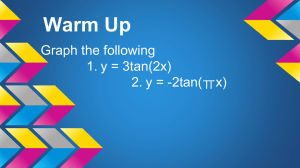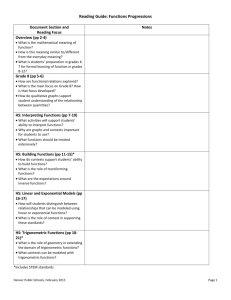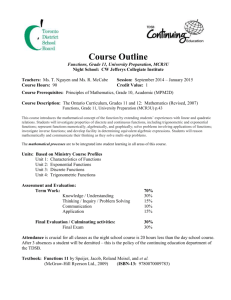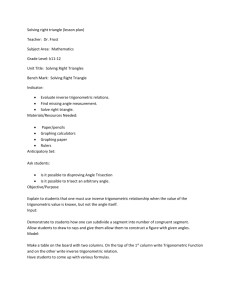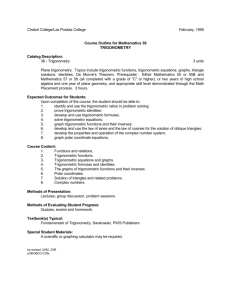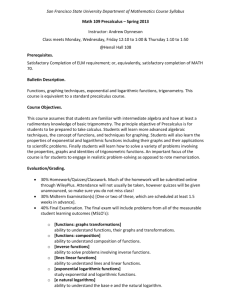Find the values of trigonometric functions for any angle, including
advertisement
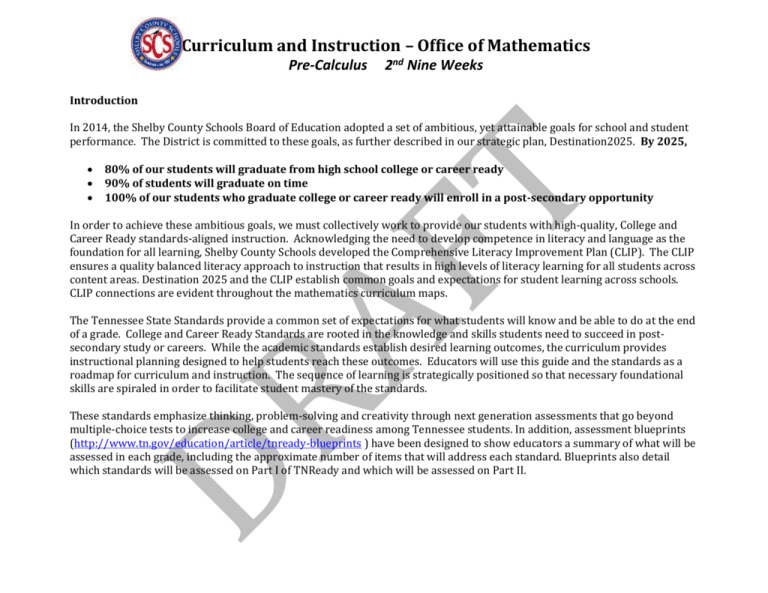
Curriculum and Instruction – Office of Mathematics Pre-Calculus 2nd Nine Weeks Introduction In 2014, the Shelby County Schools Board of Education adopted a set of ambitious, yet attainable goals for school and student performance. The District is committed to these goals, as further described in our strategic plan, Destination2025. By 2025, 80% of our students will graduate from high school college or career ready 90% of students will graduate on time 100% of our students who graduate college or career ready will enroll in a post-secondary opportunity In order to achieve these ambitious goals, we must collectively work to provide our students with high-quality, College and Career Ready standards-aligned instruction. Acknowledging the need to develop competence in literacy and language as the foundation for all learning, Shelby County Schools developed the Comprehensive Literacy Improvement Plan (CLIP). The CLIP ensures a quality balanced literacy approach to instruction that results in high levels of literacy learning for all students across content areas. Destination 2025 and the CLIP establish common goals and expectations for student learning across schools. CLIP connections are evident throughout the mathematics curriculum maps. The Tennessee State Standards provide a common set of expectations for what students will know and be able to do at the end of a grade. College and Career Ready Standards are rooted in the knowledge and skills students need to succeed in postsecondary study or careers. While the academic standards establish desired learning outcomes, the curriculum provides instructional planning designed to help students reach these outcomes. Educators will use this guide and the standards as a roadmap for curriculum and instruction. The sequence of learning is strategically positioned so that necessary foundational skills are spiraled in order to facilitate student mastery of the standards. These standards emphasize thinking, problem-solving and creativity through next generation assessments that go beyond multiple-choice tests to increase college and career readiness among Tennessee students. In addition, assessment blueprints (http://www.tn.gov/education/article/tnready-blueprints ) have been designed to show educators a summary of what will be assessed in each grade, including the approximate number of items that will address each standard. Blueprints also detail which standards will be assessed on Part I of TNReady and which will be assessed on Part II. Curriculum and Instruction – Office of Mathematics Pre-Calculus Our collective goal is to ensure our students graduate ready for college and career. The Standards for Mathematical Practice describe varieties of expertise that mathematics educators at all levels should seek to develop in their students. These practices rest on important “processes and proficiencies” with longstanding importance in mathematics education. The first of these are the NCTM process standards of problem solving, reasoning and proof, communication, representation and connections. 2nd Nine Weeks Problem Solving Connecton Representation Look for and express regularity in repeated reasoning Look for and make use of structure Make sense of problems and persevere in solving them Reason abstractly and quatitatively Mathematical Practices Attend to precision Construct viable arguments and crituqe the reasoning of others Model with mathematics Use appropriate tools strategically Reasoning and Proof Communication The second are the strands of mathematical proficiency specified in the National Research Council’s report Adding It Up: adaptive reasoning, strategic competence, conceptual understanding (comprehension of mathematical concepts, operations and relations) procedural fluency (skill in carrying out procedures flexibly, accurately, efficiently and appropriately), and productive disposition (habitual inclination to see mathematics and sensible, useful and worthwhile, coupled with a belief in diligence and one’s own efficacy). Throughout the year, students should continue to develop proficiency with the eight Standards for Mathematical Practice. Curriculum and Instruction – Office of Mathematics How to Use the Mathematic Curriculum Maps This curriculum map is designed to help teachers make effective decisions about what mathematical content to teach so that ultimately our students can reach Destination 2025. To reach our collective student achievement goals, we know that teachers must change their instructional practice in alignment with the three College and Career Ready shifts in instruction for Mathematics. We should see these shifts in all classrooms: 1) Focus 2) Coherence 3) Rigor Throughout this curriculum map, you will see resources as well as links to tasks that will support you in ensuring that students are able to reach the demands of the standards in your classroom. In addition to the resources embedded in the map, there are some high-leverage The TNCore Mathematics Standards The Tennessee Mathematics Standards: Teachers can access the Tennessee State standards, which https://www.tn.gov/education/article/mathematics- are featured throughout this curriculum map and standards represent college and career ready learning at reach respective grade level. Mathematical Shifts Focus The standards are focused on fewer topics so students can http://achievethecore.org/shifts-mathematics learn more Coherence http://achievethecore.org/shifts-mathematics Topics within a grade are connected to support focus, and learning is built on understandings from previous grades Rigor http://achievethecore.org/shifts-mathematics The standards set expectations for a balanced approach to pursuing conceptual understanding, procedural fluency, and application and modeling resources around each of the three shifts that teachers should consistently access: Subject to revision TN Precalculus Standards Shelby County Schools2015/2016 Revised 9/24/15 3 of 9 Curriculum and Instruction – Office of Mathematics Curriculum Maps: Locate the TDOE Standards in the left column. Analyze the language of the standards and match each standard to a learning target in the second column. Consult your Glencoe Precalculus © 2011 or Sullivan Precalculus: Enhanced with Graphing Utilities, 5e © 2009 Teachers’ Edition (TE) and other cited references to map out your week(s) of instruction. Plan your weekly and daily objectives, using the standards' explanations provided in the second column. Best practices tell us that making objectives measureable increases student mastery. Carefully review the web-based resources provided in the 'Content and Tasks' column and use them as you introduce or assess a particular standard or set of standards. Review the CLIP Connections found in the right column. Make plans to address the content vocabulary, utilizing the suggested literacy strategies, in your instruction. Examine the other standards and skills you will need to address in order to ensure mastery of the indicated standard. Using your Glencoe or Sullivan TE and other resources cited in the curriculum map, plan your week using the SCS lesson plan template. Remember to include differentiated activities for small-group instruction and math stations. Subject to revision TN Precalculus Standards Shelby County Schools2015/2016 Revised 9/24/15 4 of 9 Curriculum and Instruction – Office of Mathematics 2nd Nine Weeks TN State Standards Pre-Calculus Essential Understandings Content & Tasks CLIP Connections GLENCOE - Chapter 4: Trigonometric Functions Chapter 5: Trigonometric Identities & Equations SULLIVAN – Chapter 6: Trigonometric Functions Chapter 7: Analytic Trigonometry Chapter 8: Applications of Trigonometric Functions (6 weeks for instruction, review, and assessment) G-AT-1: Applied Trigonometry Use trigonometry to solve problems.* Use the definitions of the six trigonometric ratios as ratios of sides in a right triangle to solve problems about lengths of sides and measures of angles. Find the values of trigonometric functions for acute angles of right triangles. Solve right triangles. Glencoe 4-1: Right Angle Trigonometry Sullivan 8.1: Right Angle Trigonometry; Applications Glencoe Precalculus © 2011 http://connected.mcgrawhill.com/connected/login.do F-TF-1: Trigonometric Functions Convert degree measures of angles to radian and vice versa. Extend the domain of trigonometric functions using the unit circle. Derive and apply the formula for the area of a sector of a circle. Convert from radians to degrees and from degrees to radians. G-AT-3: Applied Trigonometry Use trigonometry to solve problems. Derive and apply the formulas for the area of sector of a circle. Glencoe 4-2: Degrees and Radians Sullivan 6.1: Angles and Their Measures F-TF-2: Trigonometric Functions Extend the domain of trigonometric functions Glencoe 4-3: Trigonometric Functions on the Unit Circle Subject to revision Find the values of trigonometric functions for any angle, including the unit circle. TN Precalculus Standards Glencoe TE Name the Math Preread/Prewrite Scaffolding Questions Ticket Out the Door Yesterday’s News Glencoe Study Notebook, Teacher Resources Before You Read Key Points What You’ll Learn Active Vocabulary Main Idea Helping You Remember Shelby County Schools2015/2016 Revised 9/24/15 5 of 9 Curriculum and Instruction – Office of Mathematics 2nd Nine Weeks TN State Standards Pre-Calculus Essential Understandings using the unit circle. Use special triangles to determine geometrically the values of sine, cosine, tangent for π/3, π/4 and π/6, and use the unit circle to express the values of sine, cosine, and tangent for π–x, π+x, and 2π–x in terms of their values for x, where x is any real number. F-GT-3: Graphing Trigonometric Functions Model periodic phenomena with trigonometric functions.* Graph the six trigonometric functions and identify characteristics such as period, amplitude, phase shift, and asymptotes. Content & Tasks Sullivan 6.2: Trigonometric Functions: Unit Circle Approach Real Numbers and the Unit Circle Task Unit Circle Game Graph sine and cosine functions and their transformations and determine period, amplitude, phase shift, and midline. Glencoe 4-4: Graphing Sine and Cosine Functions Sullivan 6.3: Properties of Trigonometric Functions 6.4: Graphs of Sine and Cosine Functions Graphs of Sine and Cosine (see SCS Math Tasks (Precalculus)) Graphing Sine & Cosine Functions Glencoe Precalculus © 2011 http://connected.mcgrawhill.com/connected/login.do F-GT-3: Graphing Trigonometric Functions Model periodic phenomena with trigonometric functions.* Graph the six trigonometric functions and identify characteristics such as period, amplitude, phase shift, and asymptotes. Subject to revision CLIP Connections Graph tangent and reciprocal trigonometric functions. Glencoe TE Name the Math Preread/Prewrite Scaffolding Questions Ticket Out the Door Yesterday’s News Glencoe Study Notebook, Teacher Resources Before You Read Key Points What You’ll Learn Active Vocabulary Main Idea Helping You Remember Glencoe 4-5: Graphing Other Trigonometric Functions Sullivan 6.5: Graphs of Tangent, Cotangent, Cosecant, and Secant Functions TN Precalculus Standards Shelby County Schools2015/2016 Revised 9/24/15 6 of 9 Curriculum and Instruction – Office of Mathematics 2nd Nine Weeks TN State Standards Pre-Calculus Essential Understandings Content & Tasks CLIP Connections GLENCOE - Chapter 4: Trigonometric Functions Chapter 5: Trigonometric Identities & Equations SULLIVAN – Chapter 7: Analytic Trigonometry (3 weeks for instruction, review, and assessment) F-GT-4: Graphing Trigonometric Functions Model periodic phenomena with trigonometric functions.* Find values of inverse trigonometric expressions (including compositions), applying appropriate domain and range restrictions. F-GT-5: Understand that restricting a trigonometric function to a domain on which it is always increasing or always decreasing allows its inverse to be constructed. F-GT-6: Determine the appropriate domain and corresponding range for each of the inverse trigonometric functions. F-GT-7: Graph the inverse trigonometric functions and identify their key characteristics. Evaluate and graph inverse trigonometric functions. G-TI-1: Trigonometric Identities Apply trigonometric identities to rewrite expressions and solve equations.* Apply trigonometric identities to verify identities and solve equations. Identities include: Pythagorean, reciprocal, quotient, sum/difference, double-angle, and half-angle. Identify and use basic trigonometric identities to find trigonometric values and to simplify and rewrite trigonometric expressions. Verify trigonometric identities and determine whether equations are identities. Glencoe 4-6: Inverse Trigonometric Functions Sullivan 7.1: The Inverse Sine, Cosine, and Tangent Functions 7.2: The Inverse Trigonometric Functions (Continued) Glencoe Precalculus © 2011 http://connected.mcgrawhill.com/connected/login.do Glencoe 5-1: Trigonometric Identities 5-2: Verifying Trigonometric Identities Sullivan 7.3: Trigonometric Identities Glencoe TE Name the Math Preread/Prewrite Scaffolding Questions Ticket Out the Door Yesterday’s News Glencoe Study Notebook, Teacher Resources Before You Read Key Points What You’ll Learn Subject to revision TN Precalculus Standards Shelby County Schools2015/2016 Revised 9/24/15 7 of 9 Curriculum and Instruction – Office of Mathematics 2nd Nine Weeks TN State Standards Pre-Calculus Essential Understandings Content & Tasks CLIP Connections Active Vocabulary Main Idea Helping You Remember F-GT-8: Graphing Trigonometric Functions Model periodic phenomena with trigonometric functions.* Use inverse functions to solve trigonometric equations that arise in modeling contexts; evaluate the solutions using technology, and interpret them in terms of the context. Solve trigonometric equations using algebraic techniques and using basic identities. Glencoe 5-3: Solving Trigonometric Equations Sullivan 7.7: Trigonometric Equations Glencoe Precalculus © 2011 http://connected.mcgrawhill.com/connected/login.do G-TI-2: Trigonometric Identities Apply trigonometric identities to rewrite expressions and solve equations.* Prove the addition and subtraction formulas for sine, cosine, and tangent and use them to solve problems. Use Sum/Difference identities to evaluate trigonometric expressions and solve trigonometric equations. Glencoe 5-4: Sum and Difference Identities Sullivan 7.4: Sum and Difference Formulas G-AT-5: Applied Trigonometry Use trigonometry to solve problems. Prove the Laws of Sines and Cosines and use them to solve problems. Solve oblique triangles using the Law of Cosines and the Law of Sines, including the ambiguous case. Glencoe 4-7: The Law of Sines and the Law of Cosines Sullivan 8.2: The Law of Sines 8.3: The Law of Cosines G-AT-6: Understand and apply the Law of Sines (including the ambiguous case) and the Law of Cosines to find unknown measurements in right and non-right triangles (e.g., surveying problems, resultant force). Subject to revision TN Precalculus Standards Shelby County Schools2015/2016 Revised 9/24/15 8 of 9 Curriculum and Instruction – Office of Mathematics RESOURCE TOOLBOX Textbook Resources Glencoe Precalculus © 2011 http://connected.mcgraw-hill.com/connected/login.do Sullivan Precalculus: Enhanced with Graphing Utilities, 5e © 2009. Pearson Interactmath Calculator Texas Instruments Education Casio Education TI Emulator Standards Common Core Standards - Mathematics Common Core Standards - Mathematics Appendix A TN Core The Mathematics Common Core Toolbox Common Core Lessons Videos KhanAcademy Lamar University Tutorial Tennessee’s State Mathematics Standards Tennessee’s Precalculus Standards Interactive Manipulatives http://www.ct4me.net/math_manipulatives_2.htm Additional Sites http://functions.wolfram.com http://www.opensourcemath.org http://www.analyzemath.com/Graphing/piecewise_functions.html http://www.purplemath.com/ http://www.onlinemathlearning.com/math-word-problems.html http://education.ti.com/calculators/downloads/US/Activities/Detail?i d=9530 SCS Math Tasks (Precalculus) CLIP Glencoe Reading & Writing in the Mathematics Classroom Graphic Organizers (9-12) Subject to revision TN Precalculus Standards Shelby County Schools2015/2016 Revised 9/24/15 9 of 9
